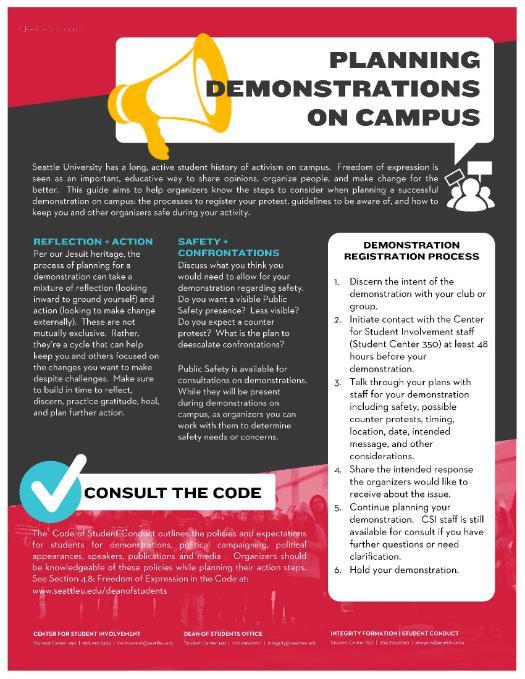
Political Activity & Demonstrations
Planning a Campus Demonstration
Planning a demonstration on campus? Your first step is to contact the Center for Student Involvement staff to talk through your plans and officially register your demonstration. To help, the quick guide on Demonstrations (on the right) provides a general overview. On this site, you will also see a compilation of resources on activism that provides helpful advice, tactics, and ways to make sure your message is not lost in the demonstration.
All policies regarding freedom of expression, demonstrations, political activity, political candidates on campus, etc. are located on the Dean of Students website under "Other University Policies." Student clubs and organizations should refer to this policy when planning these types of events and activities on campus.
For advice, consultation, and support, please see the staff in the Center for Student Involvement and the Office of the Dean of Students.
A photo of Seattle Universit student protest from the 1960's
Activism Resources
Campus protests have been a part of the fabric of higher education for many years and are part of a process to voice concerns, address needs, and advocate for the needs of students and society at large. Protests represent one piece to organizing around change on a college campus and while the most visible, often is the culmination of many hours of work for student organizers.
Whether you’re contemplating participating in a demonstration or well-versed in protest experiences, we want to provide some helpful tools to help make the most of your experience. Below is a list of resources for you to use for demonstration planning/participation on and off campus.
Learning More About Activism and Advocacy
If you're new to activism on a college campus, these articles may be helpful to determine how best to make change at Seattle University.
What is Activism? (Permanent Culture Now)
Why Being a Student Activist is More Than Just Being Mad about Something (Huffington Post)
Campus Organizing Guide for Social Justice Groups (Campus Activism)
Ten Ways to Fight Hate: A Community Response Guide (SPLC)
The Election Effect (documentary series)
Campus Decision Making and Resources
Learning more about how decisions are made at Seattle University is an important aspect of advocacy. Below are a few links to resources on campus that may help you understand more about the inner workings and management of SU.
SU Institutional Governance Structure
Office of Institutional Diversity and Inclusion
Office of Institutional Equity
Student Government of Seattle University (undergraduate student government)
Graduate Student Council (graduate student government)
Campus Activism and Social Justice Clubs (ConnectSU)
Planning an On-Campus Demonstration
At the stage where planning a demonstration will help shape your advocacy? It's important to know the process to get your demonstration registered and supported. To register your demonstration, contact the Center for Student Involvement at least 48 hours before your event by stopping by the Center for Student Involvement (STCN 350), emailing involvement@seattleu.edu; or calling (206) 296-6465 and asking to speak to the Director.
For a quick overview, check out the Demonstration Cheat Sheet by clicking on the link to the right.
Here are the important links to be aware of:
Code of Student Conduct (out of the Dean of Students Office) and aspects to review:
- Seattle University Mission, Vision, Values
- The Redhawk Commitment
- Standards of Conduct
- Freedom of Expression (Section 4.8) and Demonstrations
Conference and Event Services to reserve space for your demonstration
Public Safety for discussing safety precautions, the safety of protesters, and responses to counter protests as necessary
How to Organize an Effective, Safe, and Peaceful Protest (Medium)
The Art of Protesting: How to Organize a Protest that Brings Results (Huffington Post)
Planning/Attending an Off-Campus Demonstration
City of Seattle Special Events Office for planning and implementing a demonstration in Seattle
Wellness Resources
Counseling And Psychological Services (CAPS) located in Pavillion 120
Campus Ministry located in Student Center 120
Wellness and Health Promotion located in Student Center 380
Other Resources
Check with your academic department to see which classes you can take to learn more about activism, advocacy, social justice, equity, inclusion, etc. and how your voice can make a difference.

